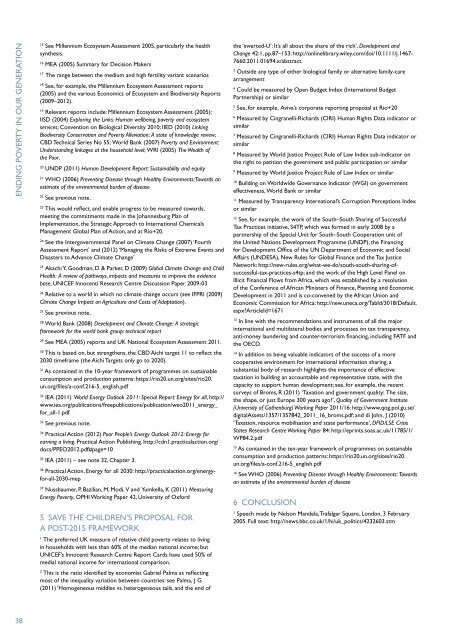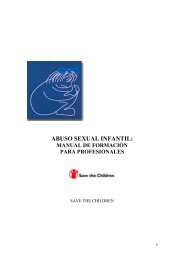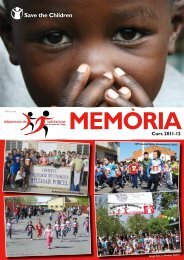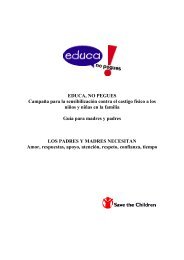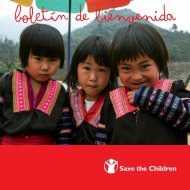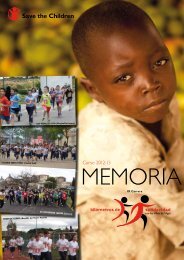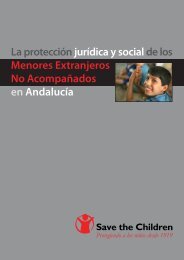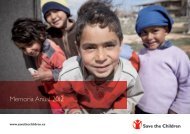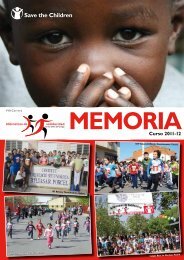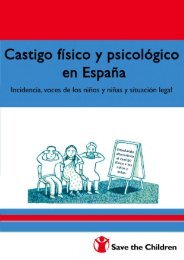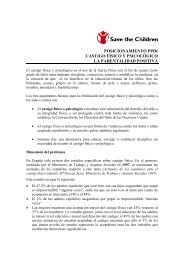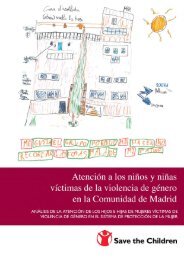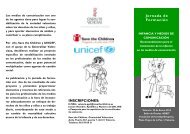ENDING poverty - Save the Children
ENDING poverty - Save the Children
ENDING poverty - Save the Children
You also want an ePaper? Increase the reach of your titles
YUMPU automatically turns print PDFs into web optimized ePapers that Google loves.
<strong>ENDING</strong> POVERTY IN OUR GENERATION<br />
15<br />
See Millennium Ecosystem Assessment 2005, particularly <strong>the</strong> health<br />
syn<strong>the</strong>sis.<br />
16<br />
MEA (2005) Summary for Decision Makers<br />
17<br />
The range between <strong>the</strong> medium and high fertility variant scenarios<br />
18<br />
See, for example, <strong>the</strong> Millennium Ecosystem Assessment reports<br />
(2005) and <strong>the</strong> various Economics of Ecosystem and Biodiversity Reports<br />
(2009–2012).<br />
19<br />
Relevant reports include: Millennium Ecosystem Assessment (2005);<br />
IISD (2004) Exploring <strong>the</strong> Links: Human wellbeing, <strong>poverty</strong> and ecosystem<br />
services; Convention on Biological Diversity 2010; IIED (2010) Linking<br />
Biodiversity Conservation and Poverty Alleviation: A state of knowledge review;<br />
CBD Technical Series No 55; World Bank (2007) Poverty and Environment:<br />
Understanding linkages at <strong>the</strong> household level; WRI (2005) The Wealth of<br />
<strong>the</strong> Poor.<br />
20<br />
UNDP (2011) Human Development Report: Sustainability and equity<br />
21<br />
WHO (2006) Preventing Disease through Healthy Environments: Towards an<br />
estimate of <strong>the</strong> environmental burden of disease<br />
22<br />
See previous note.<br />
23<br />
This would reflect, and enable progress to be measured towards,<br />
meeting <strong>the</strong> commitments made in <strong>the</strong> Johannesburg Plan of<br />
Implementation, <strong>the</strong> Strategic Approach to International Chemicals<br />
Management Global Plan of Action, and at Rio+20.<br />
24<br />
See <strong>the</strong> Intergovernmental Panel on Climate Change (2007) ‘Fourth<br />
Assessment Report’ and (2012) ‘Managing <strong>the</strong> Risks of Extreme Events and<br />
Disasters to Advance Climate Change’<br />
25<br />
Akachi Y, Goodman, D & Parker, D (2009) Global Climate Change and Child<br />
Health: A review of pathways, impacts and measures to improve <strong>the</strong> evidence<br />
base, UNICEF Innocenti Research Centre Discussion Paper 2009-03<br />
26<br />
Relative to a world in which no climate change occurs (see IFPRI (2009)<br />
Climate Change Impact on Agriculture and Costs of Adaptation).<br />
27<br />
See previous note.<br />
28<br />
World Bank (2008) Development and Climate Change: A strategic<br />
framework for <strong>the</strong> world bank group: technical report<br />
29<br />
See MEA (2005) reports and UK National Ecosystem Assessment 2011.<br />
30<br />
This is based on, but streng<strong>the</strong>ns, <strong>the</strong> CBD Aichi target 11 to reflect <strong>the</strong><br />
2030 timeframe (<strong>the</strong> Aichi Targets only go to 2020).<br />
31<br />
As contained in <strong>the</strong> 10-year framework of programmes on sustainable<br />
consumption and production patterns: https://rio20.un.org/sites/rio20.<br />
un.org/files/a-conf.216-5_english.pdf<br />
32<br />
IEA (2011) World Energy Outlook 2011: Special Report: Energy for all, http://<br />
www.iea.org/publications/freepublications/publication/weo2011_energy_<br />
for_all-1.pdf<br />
33<br />
See previous note.<br />
34<br />
Practical Action (2012) Poor People’s Energy Outlook 2012: Energy for<br />
earning a living. Practical Action Publishing. http://cdn1.practicalaction.org/<br />
docs/PPEO2012.pdf#page=10<br />
35<br />
IEA (2011) – see note 32, Chapter 3.<br />
36<br />
Practical Action, Energy for all 2030: http://practicalaction.org/energyfor-all-2030-mep<br />
37<br />
Measuring<br />
Energy Poverty, OPHI Working Paper 42, University of Oxford<br />
5 SAVE THE CHILDREN’S PROPOSAL FOR<br />
A POST-2015 FRAMEWORK<br />
1<br />
The preferred UK measure of relative child <strong>poverty</strong> relates to living<br />
in households with less than 60% of <strong>the</strong> median national income; but<br />
UNICEF’s Innocenti Research Centre Report Cards have used 50% of<br />
medial national income for international comparison.<br />
2<br />
This is <strong>the</strong> ratio identified by economist Gabriel Palma as reflecting<br />
most of <strong>the</strong> inequality variation between countries: see Palma, J G<br />
(2011) ‘Homogeneous middles vs. heterogeneous tails, and <strong>the</strong> end of<br />
<strong>the</strong> ‘inverted-U’: It’s all about <strong>the</strong> share of <strong>the</strong> rich’, Development and<br />
Change 42:1, pp.87–153: http://onlinelibrary.wiley.com/doi/10.1111/j.1467-<br />
7660.2011.01694.x/abstract.<br />
3<br />
Outside any type of ei<strong>the</strong>r biological family or alternative family-care<br />
arrangement<br />
4<br />
Could be measured by Open Budget Index (International Budget<br />
Partnership) or similar<br />
5<br />
See, for example, Aviva’s corporate reporting proposal at Rio+20<br />
6<br />
Measured by Cingranelli-Richards (CIRI) Human Rights Data indicator or<br />
similar<br />
7<br />
Measured by Cingranelli-Richards (CIRI) Human Rights Data indicator or<br />
similar<br />
8<br />
Measured by World Justice Project Rule of Law Index sub-indicator on<br />
<strong>the</strong> right to petition <strong>the</strong> government and public participation or similar<br />
9<br />
Measured by World Justice Project Rule of Law Index or similar<br />
10<br />
Building on Worldwide Governance Indicator (WGI) on government<br />
effectiveness, World Bank or similar<br />
11<br />
Measured by Transparency International’s Corruption Perceptions Index<br />
or similar<br />
12<br />
See, for example, <strong>the</strong> work of <strong>the</strong> South–South Sharing of Successful<br />
Tax Practices initiative, S4TP, which was formed in early 2008 by a<br />
partnership of <strong>the</strong> Special Unit for South–South Cooperation unit of<br />
<strong>the</strong> United Nations Development Programme (UNDP), <strong>the</strong> Financing<br />
for Development Office of <strong>the</strong> UN Department of Economic and Social<br />
Affairs (UNDESA), New Rules for Global Finance and <strong>the</strong> Tax Justice<br />
Network: http://new-rules.org/what-we-do/south-south-sharing-ofsuccessful-tax-practices-s4tp;<br />
and <strong>the</strong> work of <strong>the</strong> High Level Panel on<br />
Illicit Financial Flows from Africa, which was established by a resolution<br />
of <strong>the</strong> Conference of African Ministers of Finance, Planning and Economic<br />
Development in 2011 and is co-convened by <strong>the</strong> African Union and<br />
Economic Commission for Africa: http://new.uneca.org/TabId/3018/Default.<br />
aspx?ArticleId=1671<br />
13<br />
In line with <strong>the</strong> recommendations and instruments of all <strong>the</strong> major<br />
international and multilateral bodies and processes on tax transparency,<br />
anti-money laundering and counter-terrorism financing, including FATF and<br />
<strong>the</strong> OECD.<br />
14<br />
In addition to being valuable indicators of <strong>the</strong> success of a more<br />
cooperative environment for international information sharing, a<br />
substantial body of research highlights <strong>the</strong> importance of effective<br />
taxation in building an accountable and representative state, with <strong>the</strong><br />
capacity to support human development; see, for example, <strong>the</strong> recent<br />
<br />
<strong>the</strong> shape, or just Europe 300 years ago?’, Quality of Government Institute<br />
(University of Go<strong>the</strong>nburg) Working Paper 2011/16: http://www.qog.pol.gu.se/<br />
digitalAssets/1357/1357842_2011_16_broms.pdf; and di John, J (2010)<br />
‘Taxation, resource mobilisation and state performance’, DFID/LSE Crisis<br />
States Research Centre Working Paper 84: http://eprints.soas.ac.uk/11785/1/<br />
WP84.2.pdf<br />
15<br />
As contained in <strong>the</strong> ten-year framework of programmes on sustainable<br />
consumption and production patterns: https://rio20.un.org/sites/rio20.<br />
un.org/files/a-conf.216-5_english.pdf<br />
16<br />
See WHO (2006) Preventing Disease through Healthy Environments: Towards<br />
an estimate of <strong>the</strong> environmental burden of disease<br />
6 CONCLUSION<br />
1<br />
Speech made by Nelson Mandela, Trafalgar Square, London, 3 February<br />
2005. Full text: http://news.bbc.co.uk/1/hi/uk_politics/4232603.stm<br />
38


